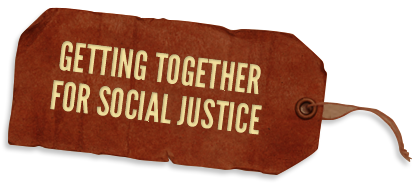Given the present economic system, we each must find strategies for surviving in the system. But not all strategies lead to the same results. Some strategies may help us survive in the short-term but may be destructive to us or to those around us in the long-term. Let’s look at possible survival strategies and see where they lead us.
Getting Ahead—We all start out as children doing what our parents and teachers tell us to. We want to work hard, stay in school, and succeed. We want to get ahead. However, we soon learn that getting ahead in our current highly individual and competitive culture means stepping on other people to move up. It can mean isolation, alienation, adopting mean-spirited values, and competing with, rather than cooperating with, others. Getting ahead can come with huge costs to ourselves and to those around us.
In addition, the road to success for many of us is filled with obstacles which become increasingly clear to us as we grow up. Poverty, racism, sexism, homophobia, lack of parental support, lack of role models, inadequate schools, mental or physical disabilities, teasing and bullying, physical and sexual assault, and limited opportunity resulting from the concentration of wealth and resources—all these keep many of us from being able to get ahead. We must turn to other strategies to make it in the system.
Getting By—Many of us give up trying to get ahead and just try to get by. We adopt an attitude of, “Just tell me what to do and I’ll do the minimum.” We are waiting for the weekend, summer vacation, the end of class, or retirement.
Getting Over—Some of us are committed to getting ahead but know we don’t have the resources or opportunity to do it by legitimate means, so we turn to illegitimate ones. We lie, cheat, turn to illegal activities, trying to get over on the system without getting caught.
Getting Around—Some of us don’t try to confront the obstacles in our way, but try to get around them by manipulation, seduction, playing the system or the people within it with whatever skills, connections, or resources we can muster for ourselves.
Getting Out—Some of us become so discouraged by the inequality and moral bankruptcy of the current system that we just want to get out. We drop out of our families, out of school, out of community life, or turn to alcohol and other drugs, computer games or other mindless activity, and drop out emotionally. Some of us become so discouraged by our inability to get ahead that we commit suicide—the ultimate way of getting out.
Getting Back—Some of us are angry at those we perceive to be in the way of our getting ahead. We pick up a gun or some other kind of weapon and try to get back at those in our way—perhaps the people who teased us or those whom we have been trained to scapegoat for our problems, such as our partners, people of color, lesbians, gays, bisexuals and trans people, or recent immigrants.
Getting Together—The only strategy which really helps us, our family, and our communities move forward is getting together with others to work for survival, healing, and social change. This is how people have always made gains; through organized struggles such as the abolition movement, the movement for women’s suffrage, unions, the civil rights movement, the disability rights movement, the lesbian and gay liberation movement, and thousands of others.
On a smaller scale, people have been getting together in workplaces, in schools, in neighborhoods, in religious communities, and many other arenas to support each other and to gain access to housing, jobs, education, and other resources, and to eliminate exploitation, discrimination, and environmental destruction.
Getting together is the strategy which both helps us get ahead; and helps change the structures of inequality, exploitation, and discrimination which put us behind in the first place. We have a long history of people getting together.
Please send comments, feedback, resources, and suggestions for distribution to paul@paulkivel.com. Further resources are available at www.paulkivel.com.
All articles may be quoted, adapted, or reprinted only for noncommercial purposes and with an attribution to Paul Kivel, www.paulkivel.com. Creative Commons Attribution – Noncommercial 3.0 United States License. To view a copy of this license visit here.
